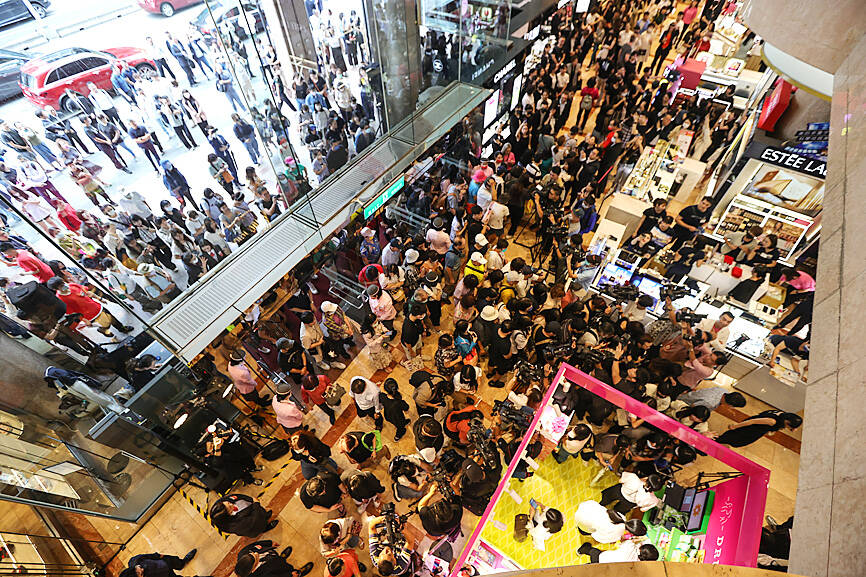Local service sector output accounted for 60.85 percent of Taiwan’s GDP last year, the 2023 Business Services Yearbook published on Friday by the Ministry of Economic Affairs showed.
The latest yearbook released by the Administration of Commerce showed that local service sector output totaled NT$13.75 trillion (US$425.28 billion) last year, up about 2.37 percent from NT$13.02 trillion a year earlier.
While the local economy slowed down in the wake of weakening global demand, the service sector stayed resilient with consumer spending increasing in the post-COVID-19 era, analysts said.

Photo: CNA
Administration of Commerce Director-General Su Wen-ling (蘇文玲) said in a statement that the service sector employed about 6.8 million people last year, accounting for about 59.96 percent of Taiwan’s total workforce.
As the service sector plays an important role in Taiwan’s economic development and job market, the commerce administration is determined to improve service industries and build a better environment to encourage consumer spending, as well as push for technology development and boost the efficiency of domestic demand-oriented industries, Su said.
In addition to large-sized department store chains, shopping malls and logistics business operators, the commerce administration also provides assistance to smaller vendors, including night market stall owners, she said.
The commerce administration would also help local sector brands expand overseas by increasing their global visibility, she added.
However, companies in the service sector should look beyond their traditional business mindset and become leaders in tackling challenges created by climate change and growing demand for environmental protection, the commerce administration said.
The government has set a goal of reaching net zero carbon emissions by 2025 and is promoting the environmental, social and governance initiatives to improve the service sector’s business sustainability and risk management, it said.

Nvidia Corp’s demand for advanced packaging from Taiwan Semiconductor Manufacturing Co (TSMC, 台積電) remains strong though the kind of technology it needs is changing, Nvidia CEO Jensen Huang (黃仁勳) said yesterday, after he was asked whether the company was cutting orders. Nvidia’s most advanced artificial intelligence (AI) chip, Blackwell, consists of multiple chips glued together using a complex chip-on-wafer-on-substrate (CoWoS) advanced packaging technology offered by TSMC, Nvidia’s main contract chipmaker. “As we move into Blackwell, we will use largely CoWoS-L. Of course, we’re still manufacturing Hopper, and Hopper will use CowoS-S. We will also transition the CoWoS-S capacity to CoWos-L,” Huang said

Nvidia Corp CEO Jensen Huang (黃仁勳) is expected to miss the inauguration of US president-elect Donald Trump on Monday, bucking a trend among high-profile US technology leaders. Huang is visiting East Asia this week, as he typically does around the time of the Lunar New Year, a person familiar with the situation said. He has never previously attended a US presidential inauguration, said the person, who asked not to be identified, because the plans have not been announced. That makes Nvidia an exception among the most valuable technology companies, most of which are sending cofounders or CEOs to the event. That includes

TARIFF TRADE-OFF: Machinery exports to China dropped after Beijing ended its tariff reductions in June, while potential new tariffs fueled ‘front-loaded’ orders to the US The nation’s machinery exports to the US amounted to US$7.19 billion last year, surpassing the US$6.86 billion to China to become the largest export destination for the local machinery industry, the Taiwan Association of Machinery Industry (TAMI, 台灣機械公會) said in a report on Jan. 10. It came as some manufacturers brought forward or “front-loaded” US-bound shipments as required by customers ahead of potential tariffs imposed by the new US administration, the association said. During his campaign, US president-elect Donald Trump threatened tariffs of as high as 60 percent on Chinese goods and 10 percent to 20 percent on imports from other countries.

INDUSTRY LEADER: TSMC aims to continue outperforming the industry’s growth and makes 2025 another strong growth year, chairman and CEO C.C. Wei says Taiwan Semiconductor Manufacturing Co (TSMC, 台積電), a major chip supplier to Nvidia Corp and Apple Inc, yesterday said it aims to grow revenue by about 25 percent this year, driven by robust demand for artificial intelligence (AI) chips. That means TSMC would continue to outpace the foundry industry’s 10 percent annual growth this year based on the chipmaker’s estimate. The chipmaker expects revenue from AI-related chips to double this year, extending a three-fold increase last year. The growth would quicken over the next five years at a compound annual growth rate of 45 percent, fueled by strong demand for the high-performance computing